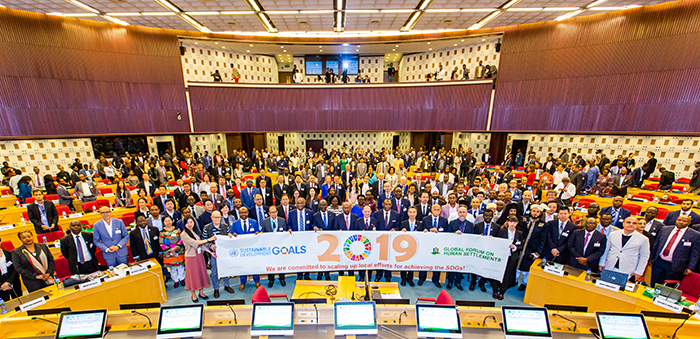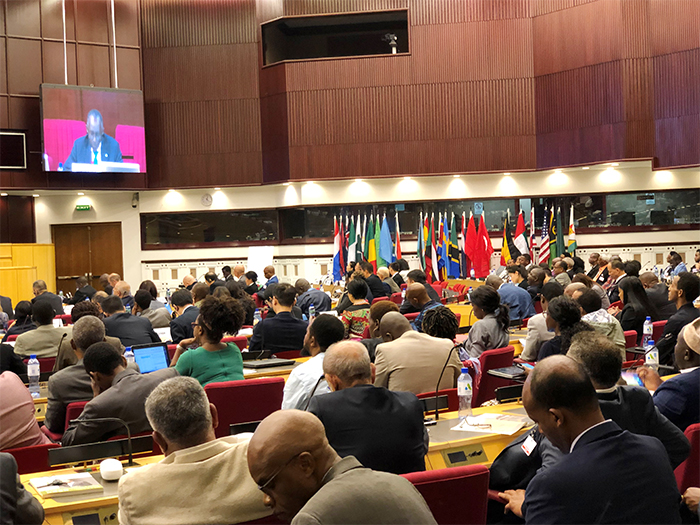Committed to Sustainable Cities and Human Settlements for All
In Special Consultative Status with ECOSOC
Addis Ababa Declaration
Harnessing the power of digital revolution for urban sustainability and prosperity for all
6 September 2019
Countries around the world are making great strides toward building a more inclusive global information society. The digital revolution is in the ascendant. Whilst information technology and the digital economy are driving economic and social transformation worldwide, they are also triggering profound changes in urban development and human settlements. These changes are reshaping our cities and communities, and at the same time altering our production mode and lifestyle. It is important to explore the opportunities and challenges that the digital revolution brings in order to ensure that no one is left behind in the process.
Therefore, the 14th Annual Session of Global Forum on Human Settlements was held on September 6 2019 at the United Nations Conference Center in Addis Ababa, Ethiopia. The participants have realized the importance of “sustainable development of cities and human settlements in the digital era” and discussed the ways in which digital technologies can be harnessed to make cities inclusive, safe, resilient, prosperous and sustainable.
We, the participants of the 14th Annual Session of Global Forum on Human Settlements, acknowledge that:
1. Africa’s increased interest in emerging disruptive technologies such as digital technology and renewable energy technologies give Africa a ‘late-comer' advantage to leverage urbanization for sustainable development. Investment in connectivity infrastructure and decentralized sustainable energy systems, and leveraging ICT to promote distributed service and industrial economies, would help to create an inclusive and productive urban economy. At the same time, strengthening international cooperation and technology transfer will support smart sustainable urban development in both developed and developing regions.
2. Digital transformation and the continuous process of society and economy-wide adoption of digital technologies to fundamentally change the way services and/or solutions are ideated, planned, designed, deployed and operated is essential for countries and regions. Digital transformation allows services to citizens to be personalized, paperless, cashless, presence-less, frictionless and consent-based.
3. Digital technologies offer significant potential in improving resource management, energy efficiency and knowledge and information exchange. The use of these technologies which consequences are being seen in critical societal changes and their spatial configurations can make urban planning smarter and more efficient. They have great prospects in improving the quality of life for all inhabitants of cities and other communities, leaving no one and no territory behind.
4. The digital economy has achieved fruitful results in transforming the traditional economy by dramatically improving existing production and consumption patterns. These powerful technologies offer new opportunities for many. It is expected that they will fundamentally challenge the existing economic structure and will have far-reaching consequences that if well governed will result in enhanced prosperity for all.
5. The digital revolution has had unprecedented impacts on human society. Human’s ethical values as well as the social and economic systems are being confronted by the disruptions brought on by different digital technologies. In particular, a growing number of jobs are being replaced by artificial intelligence and other emerging technologies, which is causing a shifting of power and required skills.
6. Digital security has become increasingly important and urgent. Business and private information, from the state to the city, from the grid to the bank, from the organization to the individual, are increasingly vulnerable to a wide-range of cyber threats and risks. Once a digital security is compromised, it may cause the entire system to be completely collapsed.
7. A digital economy that is controlled and driven by a small number of institutions can exacerbate the polarization between the rich and the poor. Having public data and digital technologies concentrated in the hands of a few may risk widening the social and economic disparities between different population groups, which does not align with the ultimate goal of the 2030 Agenda for Sustainable Development, that is to “leave no one behind”.
8. Whilst increasingly powerful digital technologies may affect the ecosystems, they cannot fundamentally alter the law of nature. That is, artificial intelligence cannot stop environmental pollution and climate change from happening, even though the technology may assist humans to better monitor them and reduce their impact.
To this end, we, the participants of the 14th Annual Session of Global Forum on Human Settlements, declare that:
1. Taking adaptive, innovative and collaborative approach. The solution to African urban challenges lies neither in the top-down command and control system nor in the bottom up self-development. What is needed is light touch top-down planning to provide guidance frameworks and structures while allowing adaptation and innovation to suit diverse needs, and bottom-up initiatives that are spontaneous, adaptive and collaborative.
2. Putting people first. The development of digital technology should adopt a people-oriented approach. Initiatives such as the United for Smart Sustainable Cities offer a useful platform to engage in global dialogues on the digital revolution and to develop consensus on key issues through an inclusive process. To address challenges such as data security and big data ethics, the views of every population group and every sector must be represented in the decision-making process and international platforms offer the best way to do so.
3. Using international standards and best practices as guidance to drive the digital revolution and sustainable urban planning. International standards such as ITU-T Recommendations, International Green Model City Standards, as well as ITU-D reports and other publications, provide requirements, specifications, best practices and/or other important guidelines that would make cities more inclusive and sustainable. These standards and best practices offer guidance on making urban strategies and plans that make cities and communities greener and smarter, promote a mixed-use and more livable community, ensure environmental efficiency by encouraging the responsible use, reuse and recycle of different resources, as well as sustainably producing energy and food that are clean and safe.
4. Integrating data. The foundation of a smart city is to establish a secure, cross-industry, cross-sectoral big data system with effective policy and regulations. Such data system provides the crucial information on how to improve social services, energy production and consumption patterns, transportation and other aspects of a city’s sustainable performance.
5. Applicable technology. Using applicable and affordable digital technologies as well as inclusive and innovative processes in urban planning, construction and management is vital in ensuring that the benefits of these technologies are shared by all. This is particularly important in order to support the implementation of the New Urban Agenda and the achievement of the SDGs, reducing and preventing pollution and resource depletion, improving ecosystems sustainable management and addressing climate change.
6. Investing in talents. To support sustainable urban development, cities, especially those are located in the late-developing regions, should strengthen their digital infrastructures and invest in expanding the people’s digital capacity through education. Prepare the younger generation to capture the opportunities that the digital revolution have to offer by cultivating the spirit of innovation, promoting the development of green economy, and giving them the tools and knowledge that would allow them to leapfrog the traditional industrialization paradigms.
7. Innovative design and infrastructure. The design and construction of public space and buildings should be fully adapted to the opportunities of the digital age, to strengthen communities’ resilience and social cohesion. Among other, expanding and rearchitecting the digital infrastructures to ensure they are stable, efficient, versatile and allowed for rapid iteration. Public spaces should be designed to enable expanded access through digital systems and applications. Buildings should also be reconfigured to reduce energy consumption and leverage the adoption of renewable energy and other digital solutions.
We call on all concerned stakeholders to act together in harnessing the power of digital revolution, to advance sustainable urban development promoting sustainable and resilient communities and the achievement of the 17 Sustainable Development Goals.






